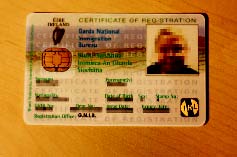When a non-EEA national arrives in Ireland, they must register with the Garda National Immigration Bureau (GNIB). The bureau’s officer, upon examining their case, issues them one of the eight stamps which show the person’s immigration status. Here is what the different stamps mean:
Stamp 1
This stamp indicates that the person can work in Ireland if they have a valid work permit. It is also granted to people who hold a business permission to start or to engage in a business in Ireland.
Stamp 2
This stamp is given to non-EEA nationals who are attending a full-time course in Ireland of at least one year’s duration and leading to qualifications recognised by the Minister for Education and Science. Stamp 2 holders are allowed to work a maximum of 20 hours per week and up to 40 hours per week during academic holidays. The stamp is only valid until the holder finishes his/her course of study. In addition, non-EEA students who have graduated on or after 1 January 2007 with a primary, Master’s or doctorate degree from an Irish third-level institution and have a current GNIB Certificate of Registration may be permitted to apply for the Third Level Graduate Scheme. People who qualify under this scheme will be granted one non-renewable extension to their current student permission for a six-month period starting on the date upon which the person receives their examination results. The purpose of the permission to remain under this scheme is to seek employment and gain a ‘green card’ or work permit.
Stamp 2A
If the person’s academic course does not fit with the requirements for Stamp 2, they are given Stamp 2A, which does not allow them to take up any employment and which is only valid until the person finishes their course.
Stamp 3
This stamp indicates that the person cannot work or study full-time in Ireland. It is given to visitors, tourists, spouses and dependants of work permit holders, or those who come to Ireland for medical treatment. The stamp makes some holders totally dependent on the immigration status of their family in Ireland.
Stamp 4
This stamp indicates that the person is entitled to work in Ireland without a work permit. For many, obtaining this stamp is the first step towards getting a full Irish passport. The stamp is given to people on work visas/authorisa-tions. It is also issued to the foreign-born spouses of Irish citizens, people who are granted asylum in Ireland, people with Irish-Born Child residency and people who have obtained long-term residency status. Tempor-arily registered doctors are also given Stamp 4.
Stamp 4 (EU FAM)
This stamp is issued to non-EEA nationals who are family members of EU citizens. Under the European Communities Regul-ations 2006, they can move to Ireland and live here with their families.
Stamp 5
This stamp is issued to non-EEA nationals who have lived in Ireland for at least eight years and who have been permitted by the Minister for Justice, Equality and Law Reform to stay in the State without condition as to time. People holding this stamp can work without a permit and they can freely engage in business.
Stamp 6
This stamp indicates that the holder is permitted to remain in Ireland without any condition. It is usually placed on foreign passports of Irish citizens who hold a dual citizenship so that both their passports show their entitlement to stay in Ireland in equal measure.












